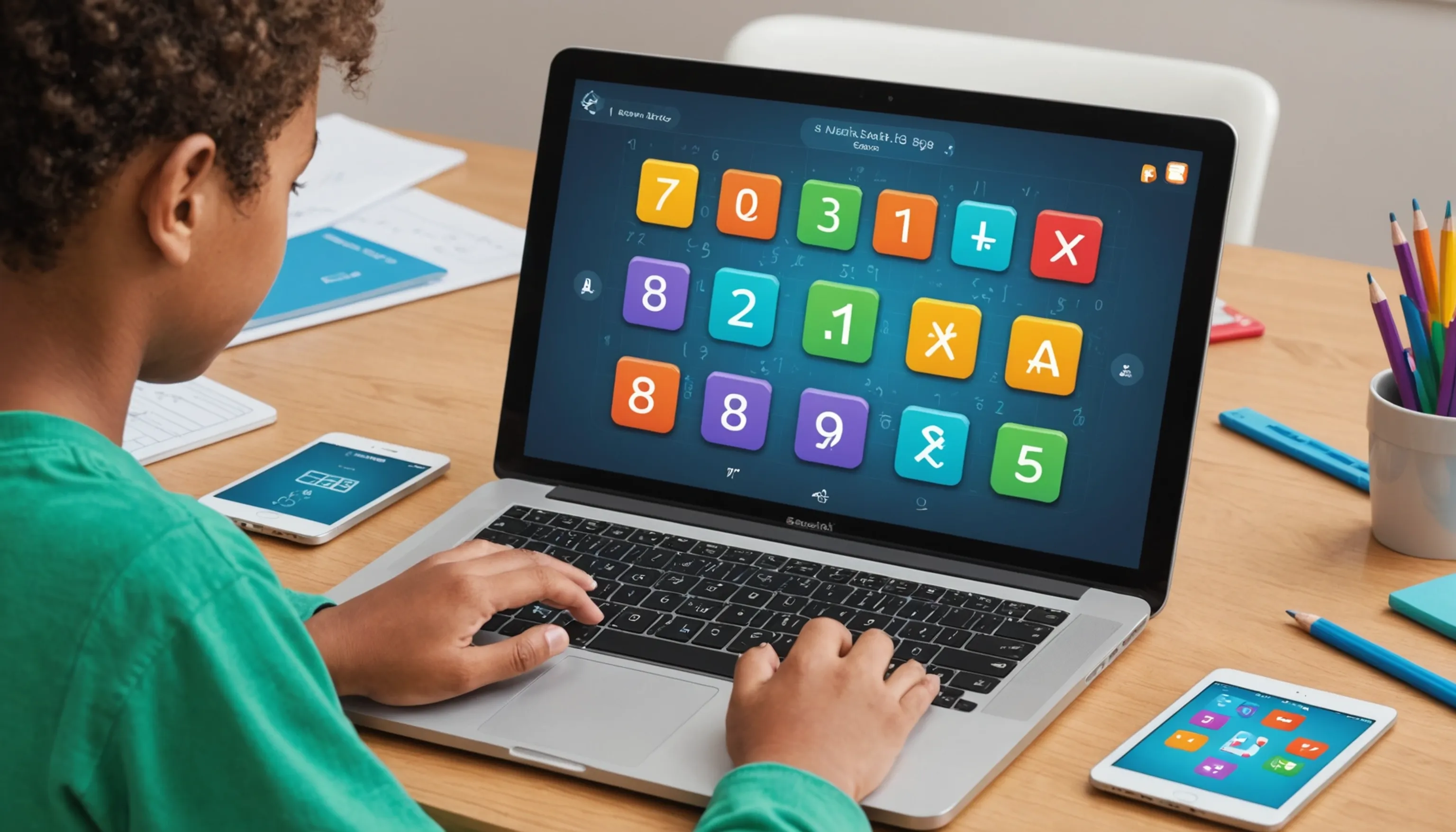Math games for kids over 10
 HvWHenry van Wagenberg
HvWHenry van Wagenberg
Math Games for Kids Over 10
Math games for kids over 10 are a fantastic way to make learning enjoyable and interactive. As teenagers develop their math skills, engaging games can help reinforce concepts and improve problem-solving abilities. These games often incorporate elements of competition and teamwork, making them appealing for older children.
Whether played in the classroom or at home, these games cater to various learning styles, allowing kids to grasp complex math concepts more easily. By incorporating fun into math learning, parents & teachers can foster a positive attitude toward mathematics.
Benefits of Math Games for Teenagers
Math games for teenagers offer numerous benefits that go beyond just improving math skills. Firstly, these games provide a fun and engaging way to practice mathematical concepts, which can often be intimidating for older kids. When math is presented in a game format, it becomes less daunting, encouraging teens to participate actively.
One significant advantage of math games is their ability to enhance critical thinking and problem-solving skills. Many games require players to strategize and think creatively to solve challenges, which helps develop essential skills that are valuable in both academic and real-world situations.
Additionally, math games often promote teamwork and collaboration. Many games can be played in groups, allowing teenagers to work together, share ideas, and learn from one another. This social interaction not only makes learning more enjoyable but also fosters communication skills and builds confidence.
Furthermore, many math games are designed to adapt to different skill levels, making them suitable for a wide range of abilities. This adaptability ensures that all players can find a challenge that suits their level, preventing frustration while still promoting growth.
Finally, the competitive aspect of math games can motivate teenagers to improve their skills. Competing against peers can drive them to practice more and strive for better performance, making math learning both effective and enjoyable.
Top Math Games for Kids Over 10
Here are some of the top math games for kids over 10 that make learning both fun and effective:
- Prodigy Math - An engaging online platform that combines gaming with math practice, allowing kids to battle monsters while solving math problems.
- Math Blaster - This classic game challenges players to solve math puzzles to complete missions, making learning exciting.
- DragonBox - A series of educational apps that teach algebra concepts through engaging gameplay, suitable for older kids.
- 24 Game - A fast-paced card game that requires players to use basic math operations to reach the number 24, enhancing mental math skills.
- Math Dice - A fun game that encourages players to roll dice and create equations to reach a target number, fostering quick thinking.
These games not only reinforce math skills but also promote critical thinking and problem-solving abilities.

Online Math Games
Online math games are an excellent resource for kids over 10, offering interactive and engaging ways to practice essential math skills. These games often incorporate exciting themes and storylines, making math practice feel more like play than study. Here are some popular online math games that can enhance learning:
- Prodigy Math - This game offers a fantasy-based adventure where students solve math problems to progress through levels and battle various characters. It's aligned with curriculum standards, making it a valuable educational tool.
- Coolmath Games - A site filled with various math-related games that focus on logic, strategy, and critical thinking. Games like “Run” and “Fireboy and Watergirl” challenge players to use math skills in creative ways.
- Math Playground - This site features a wide range of math games, from basic arithmetic to advanced problem-solving. The games are categorized by grade level, ensuring that kids can find suitable challenges.
- Khan Academy - While primarily a learning platform, Khan Academy offers interactive exercises and games that adapt to a student’s skill level, providing personalized learning experiences.
Online math games not only make learning fun but also allow kids to learn at their own pace, reinforcing concepts they may struggle with in a traditional classroom setting.
Board Games That Teach Math Skills
Board games that teach math skills provide a hands-on approach to learning, making them perfect for kids over 10. These games not only enhance math understanding but also promote social interaction and strategic thinking. Here are some popular board games that effectively teach math concepts:
- Monopoly - A classic game that involves buying, trading, and managing properties, helping players develop skills in addition, subtraction, and money management.
- Sum Swamp - Though designed for younger players, this game offers engaging math challenges for older kids as well. Players navigate a swamp while practicing addition and subtraction.
- Prime Climb - This vibrant game focuses on prime numbers and basic arithmetic. Players use strategic moves to navigate a colorful board, reinforcing multiplication and division concepts.
- Math Dice - A fast-paced game that encourages quick thinking. Players roll dice and create equations to reach a target number, sharpening mental math skills.
- 24 Game - A competitive card game where players must use basic operations to make the number 24 from four numbers, enhancing critical thinking and problem-solving abilities.
These board games not only make math practice enjoyable but also foster teamwork and communication skills, making them a great addition to family game nights or classroom activities.
Mobile Apps for Math Learning
Mobile apps for math learning have revolutionized the way kids over 10 engage with mathematics. These apps provide interactive and personalized experiences that can significantly enhance understanding and retention of math concepts. Here are some standout mobile apps that make math learning fun and effective:
- Khan Academy Kids - This app offers a wide range of math exercises tailored to different age groups. With engaging videos and interactive exercises, it adapts to each child's learning pace, making it ideal for personalized learning.
- Mathway - Perfect for older kids, Mathway allows users to input math problems and receive step-by-step solutions. This app helps students understand the process of solving problems, rather than just providing answers.
- Prodigy Math Game - Combining gaming with math practice, this app immerses kids in a fantasy world where they solve math problems to progress. It covers a variety of topics and adapts to each student's skill level.
- DragonBox - A series of apps that teach algebra and geometry concepts through playful challenges, making complex ideas accessible and enjoyable for teenagers.
- Math Bingo - This fun app combines traditional bingo with math practice, helping kids reinforce their skills in addition, subtraction, multiplication, and division while enjoying a game.
With their engaging formats and interactive features, these mobile apps are effective tools for enhancing math skills in a way that resonates with today's tech-savvy kids.

How to Choose the Right Math Game
Choosing the right math game for kids over 10 involves considering several key factors. First, assess the skill level of the child to ensure the game is challenging yet achievable. Look for games that offer different difficulty levels to cater to a range of abilities.
Next, prioritize engaging content. The game should capture the child's interest through exciting themes or interactive gameplay. Finally, check for educational value. Opt for games that align with educational standards and reinforce specific math concepts to ensure effective learning.
Consider the Skill Level
When selecting math games for kids over 10, one of the most critical factors to consider is the skill level of the child. Understanding their current abilities in math can greatly influence the effectiveness and enjoyment of the game. Games that are too easy may lead to boredom, while those that are too difficult can cause frustration and disengagement.
Start by assessing the child's proficiency in different areas of math, such as addition, subtraction, multiplication, division, fractions, and geometry. Once you have a clear picture of their strengths and weaknesses, look for games that target specific skills they need to improve. For instance, if a child struggles with fractions, seek games that focus on fraction concepts, allowing them to practice in a fun and interactive way.
Moreover, many math games now offer adaptive learning features. These games adjust their difficulty based on the player's performance, ensuring that kids are continually challenged without feeling overwhelmed. This personalized approach not only keeps them engaged but also promotes a growth mindset.
Finally, consider games that allow for collaboration or competition with peers. This social aspect can motivate kids to improve their skills while enjoying the learning process. By carefully considering the skill level, parents and teachers can choose math games that provide the right balance of challenge and fun, leading to effective learning outcomes.
Look for Engaging Content
When selecting math games for kids over 10, looking for engaging content is crucial to ensure that learning is both effective and enjoyable. Engaging content captures the child's interest and motivates them to participate actively in the learning process.
Start by considering the theme and storyline of the game. Games that incorporate exciting narratives or adventurous settings can spark a child's imagination. For example, a math game that features a quest or mission can encourage kids to solve math problems as they progress through different levels, making the experience more immersive.
Visual appeal also plays a significant role in engagement. Bright colors, captivating graphics, and interactive elements can draw kids in and keep them focused on the task at hand. Look for games that utilize animations or fun sound effects, as these features can enhance the overall experience.
Additionally, consider games that incorporate elements of competition or collaboration. Multiplayer games allow kids to team up with friends or compete against one another, fostering a sense of community and encouraging teamwork. This social interaction can make math practice feel less isolating and more dynamic.
Lastly, check for variety in the types of math challenges presented. Games that offer a mix of puzzles, quizzes, and real-world applications help maintain interest and cater to different learning styles. By focusing on engaging content, parents & teachers can ensure that math learning remains enjoyable and impactful for kids over 10.
Check for Educational Value
When selecting math games for kids over 10, it's essential to check for educational value. The primary goal of any educational game is to reinforce learning objectives while keeping children engaged. Therefore, evaluating how well a game aligns with educational standards is crucial.
Start by reviewing the specific math concepts the game covers. A high-quality math game should target various skills, such as problem-solving, critical thinking, and mathematical operations, including addition, subtraction, multiplication, and division. Games that incorporate real-world applications of math can also be highly beneficial, as they help children understand how math is used in everyday situations.
Additionally, consider whether the game provides immediate feedback. Games that offer explanations for correct and incorrect answers help kids learn from their mistakes and reinforce their understanding of concepts. This instant feedback can also motivate children to keep trying and improve their skills.
Another important aspect to check is whether the game allows for progression. High-quality math games often adapt in difficulty based on the player's performance, challenging them without causing frustration. This adaptability is essential for maintaining engagement and promoting growth.
Finally, look for games that have been reviewed by educators or have received endorsements from reputable educational organizations. These endorsements can serve as indicators of the game's educational value. By prioritizing educational value, parents & teachers can ensure that the math games chosen effectively support learning and skill development.
